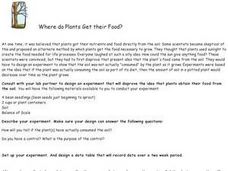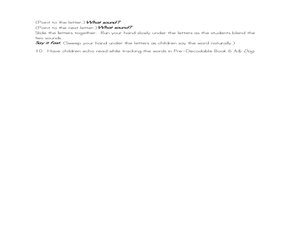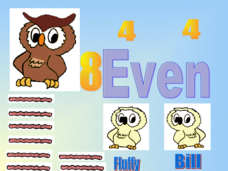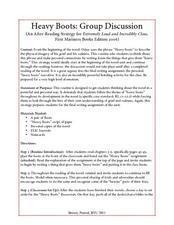National Endowment for the Humanities
Tales of the Supernatural
Scary stuff! Whether approached as the first horror story or a "serious imaginative exploration of the human condition," Frankenstein continues to engage readers. Here's a packet of activities that uses Mary Shelley's gothic novel to...
HISTORY Channel
The American Presidency Grades 7-9
As part of a study of the American Presidency, groups investigate five topics: Campaigns and Elections, Role and Responsibilities, Life in the White House, Assassination and Mourning, and Communicating the Presidency.
Teach Engineering
An Inflated Impression of Mars
Help your class understand the magnitude of the distance between Earth and Mars with an activity that asks small groups to use balloons to create scale models of the Earth, Moon, and Mars. Class members figure out the distances between...
Teach Engineering
Physics Tug of War
Slide books with a little assistance from Newton. Using books, groups create a demonstration of Newton's Second Law of motion. Pupils compare the distance traveled by one and two books when they apply a force to them.
Alabama Learning Exchange
Classifying Complex Numbers
Imaginary numbers are a real thing. Scholars learn about complex numbers, real numbers, and imaginary numbers. They classify given numbers as strictly complex, strictly real, or strictly imaginary in an individual or group activity.
Curated OER
Where Do Plants Get Their Food?
Plants need food to survive, just like any other living organism. Young biologists analyze an experiment performed in 1610 by Jan van Helmont to determine if plant nutrition is obtained through the soil. First, lab groups work together...
Curated OER
Practice Final
A full-fledged practice final prepares pupils for their general chemistry final exam. If they complete these 57 multiple-choice questions correctly, they will be well-prepared. Note: even though the questions are multiple-choice, there...
Teach Engineering
Copycat Engineers
It's often said that imitation is the sincerest form of flattery. Young engineers learn about biomimicry, which uses nature to generate engineering ideas, in the fifth lesson of nine in a Life Science unit. Working in groups, they select...
Center for Civic Education
What Basic Ideas Are in the Preamble to the Constitution?
Introduce young historians to the US Constitution with this upper-elementary social studies lesson plan. Beginning with a general discussion about the role of government in society, students go on to work in small groups identifying and...
Library of Congress
The Conservation Movement at a Crossroads: The Hetch Hetchy Controversy
Should wilderness areas be preserved or managed? Class members examine primary source documents, including lecture notes, articles, essays and congressional records to better understand the Hetch Hetchy controversy that created a split...
Curated OER
Small Group: BL
Practice target sounds, especially the /a/ sound. The teacher first speaks and learners repeat words, discriminating between words with varying sounds after focusing on /a/. Letter cards are held up to show the symbolic representation of...
Center for Civic Education
What Basic Ideas About Government Are Included in the Preamble to the Constitution?
Young historians explore the meaning of the Preamble to the US Constitution in this upper-elementary social studies lesson. Working with partners or in small groups, children discuss the purpose of government before reading and analyzing...
Curated OER
Owl Sharing: Odd and Even
Owl shares her worms with her best mates Fluffy and Bill. As worms are distributed to the two of them learners will see that when there is one left over the number is odd and when they have the same amount the number is even. This is a...
National Wildlife Federation
Massive Migrations: Grades K-8
Migratory animals follow the same path every year. Learners research the path of an assigned species and create a map highlighting key landmarks along the way. As a group, they come up with a presentation to share with their class.
National Wildlife Federation
Prairie Chicken Pageant
Diminishing habitats is a real concern that is threatening endangered species. Learners examine these concerns by studying the prairie chicken. Groups get a card with characteristics and threats to the species that they turn into skits.
National Wildlife Federation
Soil Decomposers
Worms are the kings of the decomposers. A four-part instructional activity has learners experiment with the characteristics of earthworms and their sensitivities. They vary factors such as light, acidity, temperature, and touch of soil...
National Museum of the American Indian
The Kwakwaka'Wakw: A Study of a North Pacific Coast People and the Potlatch
Discover the cultural practices and unique value systems of a group of native peoples from Canada called the Kwakwaka'wakw. Your young historians will discuss how conceptions of wealth can vary and how these native people utilized...
Middle Tennessee State University
A House Divided: The Civil War Home Front in Tennessee
To broaden their understanding of both the short term and long terms effects of the Civil War, class groups examine primary source materials and then assume the role of a family member and draft a letter to a soldier describing life at...
Middle Tennessee State University
Who's Afraid of the Big Bad Wolf? A Comparison in American Culture
As part of their study of the Progressive Era, class groups examine a 20th century version of "The Three Little Pigs" through a New Era lens and identify how ideals such as the value of hard work, creativity, and problem solving, etc.,...
Media Smarts
The Newspaper Front Page
Hot off the presses! A perfect instructional activity idea for a journalism class or even a language arts class looking to incorporate some informational texts. Young writers analyze the front pages of various newspapers to determine the...
Media Smarts
Tobacco Labels
Adolescents compare and assess the efficacy of tobacco product health warning labels from around the world. In groups, they invent warnings and create labels that would be effective for teens and children. Discussion covers advertising...
Wild BC
Is Climate Change Good for Us?
Is it really that big of a deal if the global climate undergoes a little change? Young environmentalists consider this very question as they discuss in small groups the impact of different climate change scenarios on their lives, their...
Curated OER
Heavy Boots: Group Discussion
Jonathan Safran Foer's phrase, "heavy boots," becomes the focus of a class discussion of grief and sadness. During the reading of Extremely Loud and Incredibly Close, individuals place examples of their own experiences with these topics...
Curated OER
The Little Prince: Problematic Situation
Your plane has crashed in the Sahara desert. What do you do? Explore the possibilities with a role-playing activity based on Antoine de Saint Éxupery's The Little Prince. In groups, kids decide whether they would walk to find help to try...
Other popular searches
- Equal Grouping
- Grouping Living Things
- Grouping Tens
- Brackets
- Math Grouping
- Grouping Objects
- Multiplication Grouping
- Grouping in Multiplication
- Grouping 100
- Addition Using Grouping
- Groupings of Ten
- Grouping Tens and Ones

























